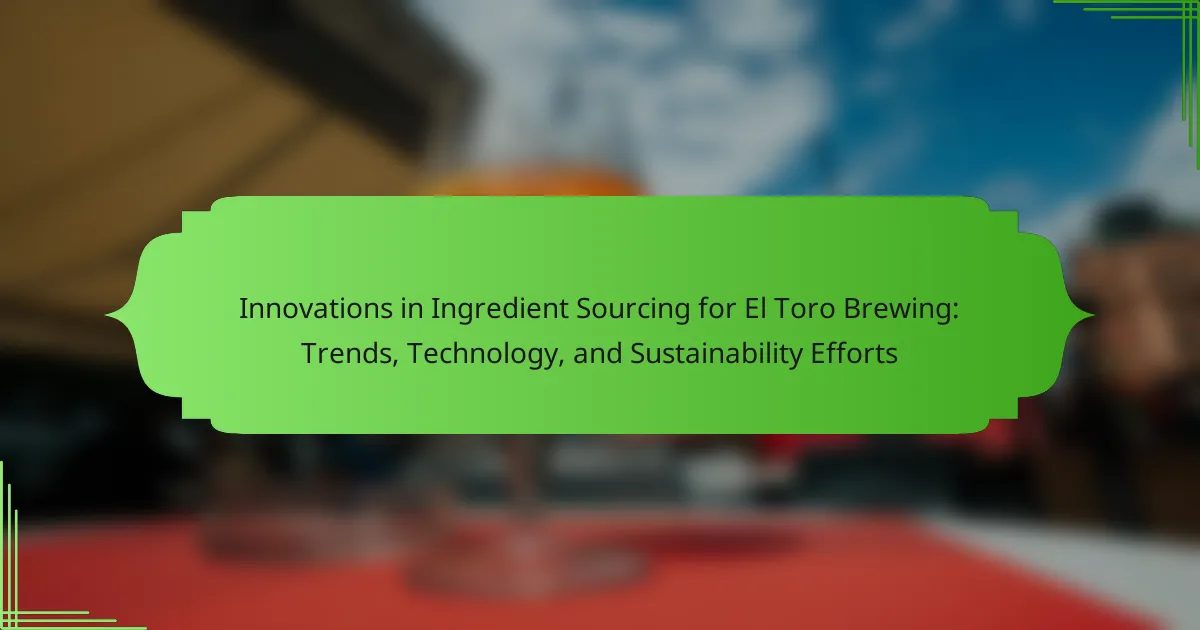El Toro Brewing is a brewery that has adopted innovative practices in ingredient sourcing, emphasizing sustainability and local partnerships. The brewery focuses on reducing transportation emissions by sourcing ingredients locally, which supports regional farmers and enhances freshness. Additionally, El Toro Brewing employs blockchain technology to ensure traceability and transparency in its supply chain, verifying the quality of ingredients. Their commitment to sustainable farming includes sourcing organic ingredients and investing in regenerative agriculture initiatives. These efforts reflect broader trends in the brewing industry towards responsible sourcing, ethical labor practices, and the demand for unique flavors.

What are the key innovations in ingredient sourcing for El Toro Brewing?
El Toro Brewing has implemented several key innovations in ingredient sourcing. They focus on local sourcing to reduce transportation emissions. This practice supports regional farmers and enhances ingredient freshness. El Toro Brewing also utilizes blockchain technology for traceability. This ensures transparency in the supply chain and verifies ingredient quality. Additionally, they are committed to sustainable farming practices. This includes sourcing organic ingredients when possible. These innovations collectively enhance both the quality of their brews and their environmental impact.
How do these innovations impact the brewing process?
Innovations in ingredient sourcing significantly enhance the brewing process. These advancements streamline the procurement of high-quality ingredients. Technologies like blockchain improve traceability, ensuring ingredient authenticity. Data analytics optimize inventory management, reducing waste and costs. Sustainable sourcing practices promote environmental responsibility, attracting eco-conscious consumers. Innovations also enable brewers to experiment with unique flavors and profiles. This diversification leads to a more dynamic product offering. Overall, these innovations enhance efficiency, quality, and sustainability in brewing.
What specific ingredients are being sourced innovatively?
El Toro Brewing is sourcing ingredients such as locally grown hops and organic grains innovatively. These ingredients are selected to enhance flavor profiles and sustainability. The use of locally sourced hops reduces transportation emissions. Organic grains support environmentally friendly farming practices. This innovative sourcing approach aligns with current trends in craft brewing. It emphasizes quality and sustainability, appealing to eco-conscious consumers. El Toro Brewing’s commitment to sourcing these ingredients reflects a growing industry focus on responsible sourcing.
How does ingredient innovation affect flavor profiles?
Ingredient innovation significantly enhances flavor profiles in food and beverages. New ingredients can introduce unique tastes and aromas that were previously unavailable. For example, the use of exotic spices can create complex flavor combinations. Additionally, advancements in fermentation techniques can alter the flavor development process. This results in more nuanced and layered flavors. Research shows that innovative ingredients can also improve flavor consistency across batches. Studies indicate that consumers often prefer products with novel flavors, driving market demand. Overall, ingredient innovation plays a crucial role in shaping contemporary flavor experiences.
Why is ingredient sourcing critical for El Toro Brewing?
Ingredient sourcing is critical for El Toro Brewing because it directly impacts the quality and flavor of their beers. High-quality ingredients ensure that the brewing process yields consistent and desirable flavors. Additionally, sourcing local and sustainable ingredients supports regional agriculture and reduces the carbon footprint associated with transportation. El Toro Brewing prioritizes ingredient transparency, which builds trust with consumers. This commitment to quality and sustainability aligns with current consumer trends favoring environmentally responsible practices. By focusing on ingredient sourcing, El Toro Brewing enhances its brand reputation and fosters customer loyalty.
What role does ingredient quality play in brewing?
Ingredient quality is crucial in brewing as it directly influences flavor, aroma, and overall beer quality. High-quality ingredients lead to a more complex and desirable flavor profile. For example, premium malts provide richer and more varied flavors. Fresh hops contribute vibrant aromas and bitterness that enhance the beer’s character. Yeast health is also vital, as it affects fermentation efficiency and flavor development. Studies show that using high-quality ingredients can improve consumer satisfaction and marketability. According to a report by the Brewers Association, quality ingredients are linked to higher ratings and repeat purchases. Thus, ingredient quality is a foundational element in successful brewing.
How does sourcing affect the overall brand reputation?
Sourcing significantly impacts overall brand reputation. Responsible sourcing builds consumer trust and loyalty. Brands that prioritize ethical sourcing often gain a competitive edge. For instance, consumers increasingly prefer products made with sustainable ingredients. A study by Nielsen found that 66% of global consumers are willing to pay more for sustainable brands. Poor sourcing practices can lead to negative publicity and loss of customer trust. Brands associated with unethical sourcing face backlash on social media. Transparency in sourcing enhances brand credibility. Overall, sourcing quality and ethics are crucial for maintaining a positive brand image.

What trends are shaping ingredient sourcing in the brewing industry?
Sustainability is a key trend shaping ingredient sourcing in the brewing industry. Breweries are increasingly prioritizing locally sourced ingredients to reduce carbon footprints. Organic and non-GMO ingredients are gaining popularity among consumers. Transparency in sourcing practices is becoming essential for brand loyalty. Technological advancements are enabling better tracking of ingredient origins. Collaborations with local farmers are enhancing supply chain resilience. The demand for unique and diverse flavors is driving experimentation with unconventional ingredients. These trends reflect a shift towards more responsible and innovative sourcing practices in brewing.
How are consumer preferences influencing ingredient sourcing?
Consumer preferences are significantly influencing ingredient sourcing in the brewing industry. Demand for natural, organic, and locally sourced ingredients is increasing. This shift is driven by consumer awareness of health and sustainability issues. As a result, breweries are prioritizing transparency in their ingredient sourcing. Consumers seek detailed information about ingredient origins and production methods. This trend encourages breweries to establish direct relationships with local farmers and suppliers. Research shows that 67% of consumers prefer products made with sustainably sourced ingredients. Consequently, breweries adopting these practices gain a competitive edge in the market.
What specific consumer trends are noticeable in the craft beer market?
Consumers are increasingly favoring craft beer that emphasizes local sourcing and sustainability. This trend reflects a growing interest in supporting local economies and reducing carbon footprints. Many consumers seek unique flavors and styles that differentiate craft beer from mass-produced options. A significant number of craft beer drinkers prioritize quality ingredients, often preferring organic or non-GMO options. Additionally, there is a notable rise in demand for low-alcohol and non-alcoholic craft beer alternatives. This shift caters to health-conscious consumers who still want to enjoy the craft beer experience. The use of innovative brewing techniques and experimental flavors is also gaining popularity. Craft breweries are increasingly engaging with consumers through social media and community events to build brand loyalty. These trends collectively indicate a shift towards more conscious and engaged consumer behavior in the craft beer market.
How does transparency in sourcing affect consumer trust?
Transparency in sourcing significantly enhances consumer trust. When companies disclose the origins of their ingredients, it fosters a sense of honesty. Consumers feel more informed about what they are consuming. This openness can lead to increased brand loyalty. A study by Label Insight found that 94% of consumers are more likely to be loyal to brands that offer complete transparency. Furthermore, transparency helps in building a positive brand image. It allows consumers to align their values with those of the brand. Consequently, this can lead to higher sales and customer retention rates.
What technological advancements are being utilized in ingredient sourcing?
Technological advancements in ingredient sourcing include blockchain, AI, and IoT. Blockchain technology enhances traceability and transparency in supply chains. It allows for secure tracking of ingredient origins and quality. AI algorithms analyze data for predicting ingredient availability and pricing trends. Internet of Things (IoT) devices monitor environmental conditions during ingredient storage and transportation. These technologies improve efficiency and reduce waste. According to a 2021 report by McKinsey, companies using AI in supply chains can reduce costs by up to 20%.
How does data analytics enhance sourcing decisions?
Data analytics enhances sourcing decisions by providing insights into supplier performance and market trends. It allows businesses to analyze data related to costs, quality, and delivery times. This analysis helps identify the most reliable suppliers. Furthermore, data analytics can forecast demand, enabling better inventory management. It also uncovers patterns in purchasing behavior, which can optimize sourcing strategies. According to a report by McKinsey, companies using advanced analytics can improve sourcing efficiency by up to 20%. This quantifiable improvement highlights the effectiveness of data analytics in informed decision-making.
What role do supply chain technologies play in sourcing efficiency?
Supply chain technologies significantly enhance sourcing efficiency. They streamline processes, reduce costs, and improve visibility. Technologies such as ERP systems facilitate real-time data sharing. This enables better decision-making and faster response times. Automation reduces manual errors and accelerates procurement cycles. Additionally, data analytics helps identify optimal suppliers and pricing strategies. According to a report by McKinsey, companies using advanced supply chain technologies can reduce sourcing costs by up to 20%. Thus, integrating these technologies is crucial for improving sourcing efficiency in the brewing industry.

What sustainability efforts are being implemented in ingredient sourcing?
Sustainability efforts in ingredient sourcing include the use of organic farming practices. These practices reduce chemical usage and promote biodiversity. Additionally, El Toro Brewing sources ingredients locally to minimize carbon footprints. This approach supports local economies and reduces transportation emissions. Sustainable sourcing also involves selecting suppliers committed to ethical labor practices. Transparency in the supply chain ensures responsible sourcing of raw materials. Moreover, El Toro Brewing invests in regenerative agriculture initiatives. These initiatives restore soil health and enhance ecosystem resilience. Overall, these efforts contribute to a more sustainable brewing process.
How is El Toro Brewing addressing environmental concerns?
El Toro Brewing is addressing environmental concerns through sustainable practices in ingredient sourcing. They prioritize local and organic ingredients to reduce transportation emissions. The brewery implements water conservation techniques in its brewing process. They utilize energy-efficient equipment to minimize energy consumption. El Toro Brewing also engages in waste reduction initiatives, such as recycling and composting. Their commitment to sustainability is evident in their partnerships with eco-friendly suppliers. This approach not only supports the environment but also promotes local economies.
What sustainable practices are being adopted in sourcing?
Sustainable practices in sourcing include using local suppliers and organic ingredients. These practices reduce transportation emissions and support local economies. Additionally, many companies are adopting fair trade certifications. Fair trade ensures equitable trading conditions for farmers. Another practice involves utilizing regenerative agriculture techniques. Regenerative agriculture enhances soil health and biodiversity. Companies are also focusing on reducing packaging waste. This includes using recyclable or biodegradable materials. These sustainable practices are increasingly recognized as essential for environmental responsibility.
How do these practices impact local communities?
Innovations in ingredient sourcing impact local communities by promoting economic growth and sustainability. These practices often involve sourcing ingredients from local farmers and suppliers. This supports local agriculture and stimulates the local economy. For example, El Toro Brewing’s commitment to sourcing locally can increase demand for regional crops. This, in turn, provides farmers with stable income and job opportunities. Additionally, sustainable sourcing practices reduce environmental impact. They help preserve local ecosystems and promote biodiversity. Overall, these practices foster community resilience and enhance social responsibility.
What challenges does El Toro Brewing face in sustainable sourcing?
El Toro Brewing faces several challenges in sustainable sourcing. One significant challenge is the availability of certified sustainable ingredients. Many suppliers struggle to meet sustainability certifications. This limits El Toro’s options for sourcing materials. Another challenge is the fluctuating prices of sustainable ingredients. Price volatility can impact budgeting and profit margins. Additionally, El Toro must navigate complex supply chains. These supply chains often involve multiple stakeholders with varying sustainability practices. Lastly, consumer expectations for transparency are rising. El Toro must effectively communicate its sourcing practices to maintain customer trust.
How can El Toro Brewing overcome sourcing challenges?
El Toro Brewing can overcome sourcing challenges by diversifying its supplier base. This approach reduces dependency on a single source and mitigates risks. Establishing partnerships with local farmers can enhance ingredient quality and sustainability. Utilizing technology for supply chain management improves transparency and efficiency. Implementing data analytics helps forecast demand and optimize inventory levels. Engaging in community sourcing initiatives can strengthen relationships and ensure consistent supply. Collaborating with industry peers may lead to shared resources and knowledge. These strategies can enhance El Toro Brewing’s resilience in ingredient sourcing.
What partnerships are crucial for successful sustainable sourcing?
Crucial partnerships for successful sustainable sourcing include collaborations with local farmers, suppliers, and environmental organizations. Local farmers provide fresh, sustainable ingredients that reduce transportation emissions. Suppliers focused on sustainability ensure ethically sourced materials. Environmental organizations offer expertise in sustainable practices and certifications. Collaborating with these entities enhances transparency in the supply chain. This approach fosters community support and promotes biodiversity. Research shows that companies engaged in such partnerships often achieve greater sustainability goals. For instance, a study by the World Resources Institute highlights the benefits of local sourcing in reducing carbon footprints.
What best practices can El Toro Brewing adopt for effective ingredient sourcing?
El Toro Brewing can adopt several best practices for effective ingredient sourcing. First, they should establish strong relationships with local farmers and suppliers. This can enhance quality and reduce transportation costs. Second, implementing a transparent supply chain can improve traceability. This allows for better quality control and accountability. Third, they should prioritize sustainability in sourcing practices. This includes selecting organic or sustainably grown ingredients. Fourth, utilizing technology for inventory management can optimize ingredient usage. This can minimize waste and ensure freshness. Lastly, conducting regular quality assessments can maintain high standards. These practices collectively support El Toro Brewing’s commitment to quality and sustainability.
El Toro Brewing is the primary entity discussed in the article, which focuses on innovations in ingredient sourcing. Key topics include local sourcing practices that enhance ingredient freshness and reduce emissions, the use of blockchain technology for supply chain transparency, and the commitment to sustainable farming. The article further explores the impact of these innovations on the brewing process, flavor profiles, and overall brand reputation, as well as consumer trends favoring sustainable and locally sourced ingredients. Additionally, it highlights the challenges faced in sustainable sourcing and best practices for effective ingredient procurement.


